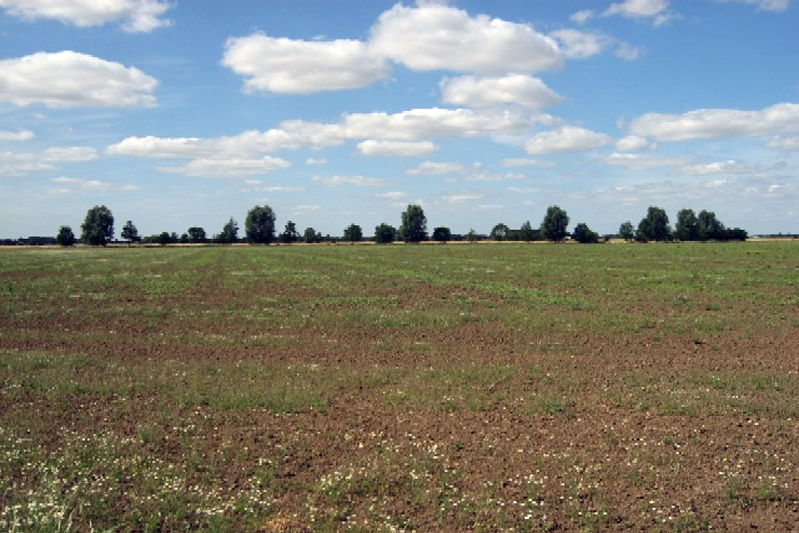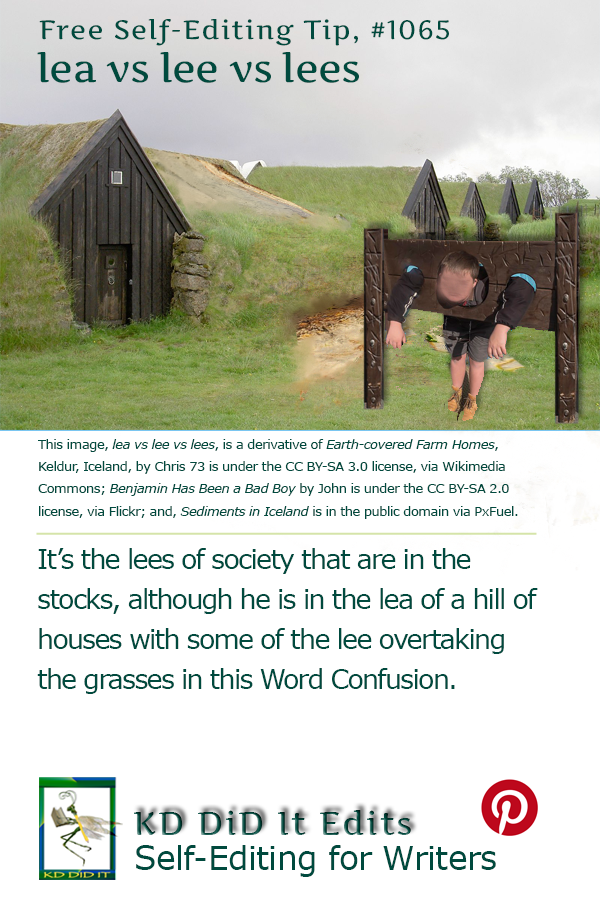Revised as of
16 Jan 2023
The lea versus lee word confusion is an heterograph (a subset of homophone) while the additional lees has nothing to do with lee. Well, okay, lee does have a plural form, but the plural form of lee still has nothing to do with lees.
Lea splits itself between a type of land (and/or how it’s used) and threads used in weaving. It can also be a proper name.
Lee is all about shelter. And yes, another proper name.
Lees are the dregs, whether that’s the sediment you find in the bottom of a wine bottle, cask, or glass or the unwanted.
Word Confusions . . .
. . . started as my way of dealing with a professional frustration with properly spelled words that were out of context in manuscripts I was editing as well as books I was reviewing. It evolved into a sharing of information with y’all. I’m hoping you’ll share with us words that have been a bête noire for you from either end.
If you found this post on “Lea vs Lee vs Lees” interesting, consider subscribing to KD Did It, if you’d like to track this post for future updates.
| Lea | Lee | Lees |
|---|---|---|

A Fallow Field by Roger Gilbertson is under the CC BY-SA 2.0 license, via Geograph.org.uk. — A field in lea. |

Crystal Springs Dam Leeside was uploaded by KGLavin and is under the CC BY 2.5 license, via Wikimedia Commons. |

Sediment in Wine by Monica Yichoy is under the CC BY 2.0 license, via Wikimedia Commons. — It’s the lees that are left. |
| Part of Grammar: | ||
| Adjective 1; Noun 1, 2; Proper noun 3
Plural for the noun: leas Alternative spelling: ley |
Adjective 1; Noun 1; Proper noun 2
Plural for the noun: lees |
Plural noun
Singular noun: lees |
| Adjective: Untilled 1
Noun: Meadow Land used for a few years for pasture or for growing hay, then plowed over and replaced by another crop A crop of hay on tillable land A scythe [Textiles] A measure of yarn of varying quantity, for wool usually 80 yards (73 meters), cotton and silk 120 yards (110 meters), linen 300 yards (274 meters) 2
[Textile] One of the sets of alternating threads into which the yarns of a loom are divided by the harness system so as to form the shed
Proper noun: An English surname, a variant of Lee |
Adjective: Pertaining to, situated in, or moving toward the protective shelter 1 Noun:
[Chiefly nautical] The quarter or region toward which the wind blows Proper noun: |
The sediment of wine in the barrel
|
| Examples: | ||
| Adjective: On the infertile Bagshot Beds the large area of the New Forest remains in lea under its ancient oaks. They left the land in lea for a year. Part of the arable soil still lies in lea. Noun: Some distance away, atop a grassy knoll upon the lea, they had laid her to rest in an unmarked grave, as alone in death as she had been in life. He is also aware of the need to sow grass seed to ensure a choice of area for lea ploughing next year. “But this I know, I love to play In the meadow, among the hay– Up the water, and o’er the lea, That’s the way for Billy and me” (Hogg). “Willy has decided to send Mally and the bairns away from the farm, while he will sharpen his old lea and remain behind to defend his homestead” (Moorman). One lea is 120 yards. She had a choice between a 20- or 40-lea yarn. There are many things that can cause the lea to not separate cleanly, and thus produce a poor shed. A slack lea can cause a poor shed. Proper noun: The movies in which Lea Salonga has starred include Aladdin, Miss Saigon, and Les Misérables. Lea Michele will portray Fanny Brice in Funny Girl. Homer Lea was a U.S. soldier, author, and adviser from 1911–12 to Sun Yat-sen in China. |
Adjective: ‘Ware the lee shore with its rocks and wrecks. If your boat enters a “no-sail-zone”, you could drift into the lee shore. “We parked our vehicles beside the hotel on what we considered to be the lee side from the shelling and went into the building” (Stewart). Noun: We pitched our tents in the lee of a rock. The lee of the rock gave us some protection against the storm. We erected our huts under the lee of the mountain. Careless steering brought the wind by the lee. Proper noun: Robert E. Lee was a famous Confederate general. Gypsy Rose Lee was infamous for her dancing. |
Holding up the bottle, Cedric said, “We’re down to the lees, my friend.”
The wine is aged on the lees in the bottle for about three years prior to disgorgement. Potassium tartrate, the source of this white residue, is sometimes referred to as lees. They were the lees of the Venetian underworld. |
| Derivatives: | ||
| Noun: lealand | Adjective: leeward Adverb: leeward Noun: leeward |
|
| History of the Word: | ||
|
|
Late Middle English as the plural of the obsolete lee in the same sense, from the Old French lie, from the medieval Latin liae (plural), of Gaulish origin. |
C’mon, get it out of your system, bitch, whine, moan . . . which words are your pet peeves? Also, please note that I try to be as accurate as I can, but mistakes happen or I miss something. Email me if you find errors, so I can fix them . . . and we’ll all benefit!
Satisfy your curiosity about other Word Confusions on its homepage or more generally explore the index of self-editing posts. You may also want to explore Book Layout & Formatting Ideas, Formatting Tips, Grammar Explanations, Linguistics, Publishing Tips, the Properly Punctuated, Writing Ideas and Resources, and Working Your Website.
Resources for Lea vs Lee vs Lees
Apple Dictionary.com
Hogg, James. “A Boy’s Song.” Bartleby.com. n.d. Web. 27 Mar 2022. <https://www.bartleby.com/101/513.html>.
Moorman, F.W. Yorkshire Dialect Poems. The Project Gutenberg EBook: 2001. <https://www.gutenberg.org/files/2888/2888-8.txt>.
Stewart, Lt-Col Bob. Broken Lives. HarperCollins Publishers, 1993.
Wordnik.com: lea
WordReference.com: lea
YourDictionary.com: lea
Pinterest Photo Credits:
Earth-covered Farm Homes, Keldur, Iceland, by Chris 73 is under the CC BY-SA 3.0 license, via Wikimedia Commons; Benjamin Has Been a Bad Boy by John is under the CC BY-SA 2.0 license, via Flickr; and, Sediments in Iceland is in the public domain via PxFuel. Only the boy from the middle image and small parts of this last image were used for the sediment.


